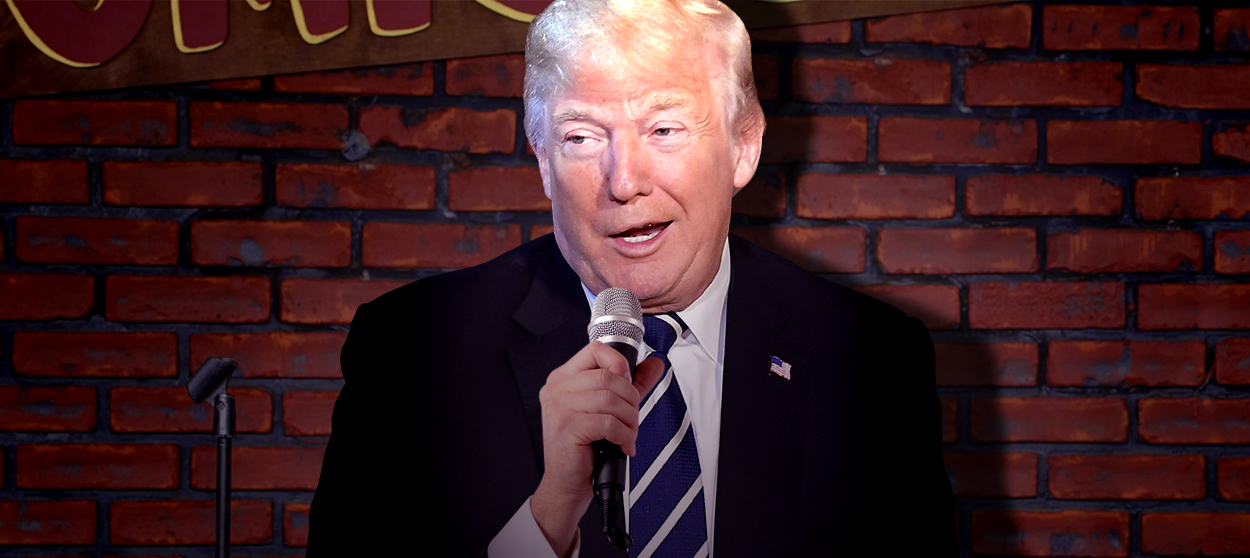What all of President Trump's 'jokes' have in common
A joke is not a joke if it has to be explained


A free daily email with the biggest news stories of the day – and the best features from TheWeek.com
You are now subscribed
Your newsletter sign-up was successful
The day the Mueller report was released, President Trump said he might stay in the Oval Office "at least for 10 or 14 years." Trump, fearing "bedlam" over this remark, said it was a "joke," similar to the one he made last year when he expressed interest in being "president for life."
Trump loves to joke around. His wit is so subtle, so nuanced, that sometimes it takes years to decipher it, along with a spokesperson to clarify it.
Earlier this month, White House press secretary Sarah Sanders said that Trump "was making a joke during the 2016 campaign" when he said, "I love WikiLeaks." Her clarification came three days after Julian Assange, the founder of WikiLeaks, was arrested and three years after Trump made the "joke."
The Week
Escape your echo chamber. Get the facts behind the news, plus analysis from multiple perspectives.

Sign up for The Week's Free Newsletters
From our morning news briefing to a weekly Good News Newsletter, get the best of The Week delivered directly to your inbox.
From our morning news briefing to a weekly Good News Newsletter, get the best of The Week delivered directly to your inbox.
Everyone knows that a joke is not a joke if it has to be explained. With Trump, the inverse is true: When he says something that he can't explain, it becomes a joke. His statements become jokes retroactively, when they become inconvenient.
In 2017, the president of the United States implored police officers to beat up suspects. After the New York Police Department and the president of the Major Cities Chiefs Association released statements rebuking his comments, Sanders said, "He was making a joke at the time."
Similarly, when Trump accused Democrats of treason for not clapping for him at his State of the Union address, he was, Sanders said, "clearly joking with his comments." (No word yet on whether Trump was joking when he tweeted earlier this month that Democrats were "TREASONOUS.")
When Trump thanked Vladimir Putin for expelling American diplomats from the U.S. Embassy in Moscow, he was being "tongue-in-cheek," according to a then-Rep. Ron DeSantis (R-Fla.).
A free daily email with the biggest news stories of the day – and the best features from TheWeek.com
Trump "made a joke" when he challenged former Secretary of State Rex Tillerson to an IQ test. "Maybe you guys should get a sense of humor and try it sometime," Sanders told reporters.
(Neither Sanders nor Trump, who thinks Saturday Night Live deserves "retribution," nor any other administration staffers attended this year's White House Correspondents' Dinner, an annual event traditionally featuring a professional comedian telling jokes.)
After Trump said that Americans should sit up at attention when he speaks, he told a reporter he was "kidding. You don't understand sarcasm."
But Trump's sarcasm is not easy to discern. It's not sarcasm if you really mean it. He says he was "sarcastic" when he said at a press conference in 2016, "Russia, if you're listening, I hope you're able to find the 30,000 emails that are missing." Russian hackers, unable to detect Trump's sarcasm, attempted to do just that within five hours of Trump's sardonic request, according to the Mueller report.
After Trump said, on multiple occasions, that Barack Obama was "the founder of ISIS," Hugh Hewitt said Trump was being metaphorical, Breitbart said Trump was "literally" correct, and Trump said he was being "sarcastic but not that sarcastic," which was a way of recanting and repeating his slur at the same time.
We never know if Trump means what he says, and neither does he. There are as many interpretations of his words as there are words in his vocabulary. His speech is performative, as even he acknowledges. At CPAC this year, Trump told the audience, "Our great first lady always said, 'Don't use certain words, please.' I said, 'But the audience wanted me to do it.'"
When certain words come back to haunt him, he claims he didn't mean them. Retroactive sarcasm gives him plausible deniability — a way to make shameless statements without being held accountable for them. If Congress impeaches Trump for obstruction of justice, no doubt his lawyers will say that he obstructed justice sarcastically.
In his book Talk Is Cheap: Sarcasm, Alienation, and the Evolution of Language, Professor John Haiman describes this tactic as "a kind of self-protective and preemptive self-abasement, comparable to the submissive posture of dogs and wolves in the presence of the alpha male." Implicit in every word Trump utters is a meta-message: "I don't really stand by this; confronted by opposition I will cut and run... You thought I was serious? Ha ha!"
Other provocateurs use this same excuse. Milo Yiannopoulos claimed he "wasn't being serious" when he said he couldn't wait for "vigilante squads to start gunning journalists" just days before a gunman killed five journalists last year.
You can't have it both ways. You can't incite violence, lie, and insult people and then claim comedic immunity, especially when you aren't funny. Trollery is not drollery.
Trump can't take a joke or tell one. When he said he was running for president, millions of people took him seriously.
Windsor Mann is the editor of The Quotable Hitchens: From Alcohol to Zionism.
-
 How to Get to Heaven from Belfast: a ‘highly entertaining ride’
How to Get to Heaven from Belfast: a ‘highly entertaining ride’The Week Recommends Mystery-comedy from the creator of Derry Girls should be ‘your new binge-watch’
-
 The 8 best TV shows of the 1960s
The 8 best TV shows of the 1960sThe standout shows of this decade take viewers from outer space to the Wild West
-
 Microdramas are booming
Microdramas are boomingUnder the radar Scroll to watch a whole movie
-
 The billionaires’ wealth tax: a catastrophe for California?
The billionaires’ wealth tax: a catastrophe for California?Talking Point Peter Thiel and Larry Page preparing to change state residency
-
 Bari Weiss’ ‘60 Minutes’ scandal is about more than one report
Bari Weiss’ ‘60 Minutes’ scandal is about more than one reportIN THE SPOTLIGHT By blocking an approved segment on a controversial prison holding US deportees in El Salvador, the editor-in-chief of CBS News has become the main story
-
 Has Zohran Mamdani shown the Democrats how to win again?
Has Zohran Mamdani shown the Democrats how to win again?Today’s Big Question New York City mayoral election touted as victory for left-wing populists but moderate centrist wins elsewhere present more complex path for Democratic Party
-
 Millions turn out for anti-Trump ‘No Kings’ rallies
Millions turn out for anti-Trump ‘No Kings’ ralliesSpeed Read An estimated 7 million people participated, 2 million more than at the first ‘No Kings’ protest in June
-
 Ghislaine Maxwell: angling for a Trump pardon
Ghislaine Maxwell: angling for a Trump pardonTalking Point Convicted sex trafficker's testimony could shed new light on president's links to Jeffrey Epstein
-
 The last words and final moments of 40 presidents
The last words and final moments of 40 presidentsThe Explainer Some are eloquent quotes worthy of the holders of the highest office in the nation, and others... aren't
-
 The JFK files: the truth at last?
The JFK files: the truth at last?In The Spotlight More than 64,000 previously classified documents relating the 1963 assassination of John F. Kennedy have been released by the Trump administration
-
 'Seriously, not literally': how should the world take Donald Trump?
'Seriously, not literally': how should the world take Donald Trump?Today's big question White House rhetoric and reality look likely to become increasingly blurred
